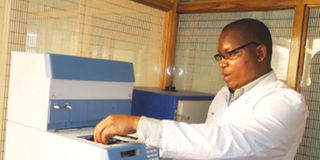No room for sloppiness

PHOTO | PAULINE KAIRU
What you need to know:
- The bottom line in this career is to identify and understand substances in terms of how they behave in different conditions and their levels of toxicology
Richard Gachukia is busy in a laboratory at Mt Kenya University. He has been doing research on a new method to formulate a combination of three painkiller tablets into one.
He sounds jubilant about the prospects. It is all this analytical chemist can talk about as he shows me around the labs at the university.
We get to the section of the block where the school is installing a wing that will hold special labs for its research and innovation centre. Here, Gachukia points to a few machines, which he refers to as, “my babies”.
This is understandable. As the chief technologist at the university’s School of Pharmacy, Gachukia has been instrumental in sourcing for most of the equipment here. These machines are his tools of trade.
An analytical chemist, he says, uses a diverse range of methods to investigate the chemical nature of different substances. For him, working in a pharmaceutical setting, most of his work involves analysing drugs and a host of medical devices.
He seems to enjoy the work, judging by the way he speaks about it. And he is emphatic that you must like and enjoy chemistry.
Besides, he says, “A chemist who does not like what they do will be casual about the work, which can be disastrous. You simply can’t afford to be sloppy in the lab.”
It is necessary for one to be aware of the health and safety issues in all aspects of the work.
Well, the road to chemistry has always been a fun one for Gachukia since his high school days. He always looked forward to the occasional explosion caused by a reaction during laboratory experiments, he recalls. Perhaps it is the reason he fought hard to become a lab captain.
His job can be thought of as a laboratory detective, although he also supervises the technical staff at the pharmacy school. Additionally, he lectures at the university.
“This is one of the most interesting jobs. You get to unearth and learn new things almost on a daily basis,” he says.
At the beginning of his career after his college degree in analytical chemistry, Gachukia had a short stint at the Government Chemist doing water analysis and forensics before joining the National Quality Control Lab as a quality control analyst.
The latter job involved testing drugs dispensed in chemists for public consumption. The aim was to determine their quality and stability.
From his enumeration, it is clear that the techniques used and activities carried out vary in this trade depending on the area of specialisation. In government research institutions, for instance, the tasks revolve around chemical monitoring and quality assurance.
The bottom line in this career, he says, is to identify and understand substances in terms of how they behave in different conditions and their levels of toxicology.
In Gachukia’s view, this field of work requires a lot of patience and focus. It takes more than merely walking through things.
“These are things you do, not once or twice, but involve so many trials before your results can be confirmed,” he says of his painkiller research, for example.
To excel in the job, he advises, you must love reading. You should also be keen to follow instructions, adhering to strict guidelines because most of the techniques used in research are contained in scientific manuals.
Gachukia is disheartened that many samples have to be flown out of the country for testing.
He says it is time Kenya developed the field and had capacity to handle certain crucial research.




